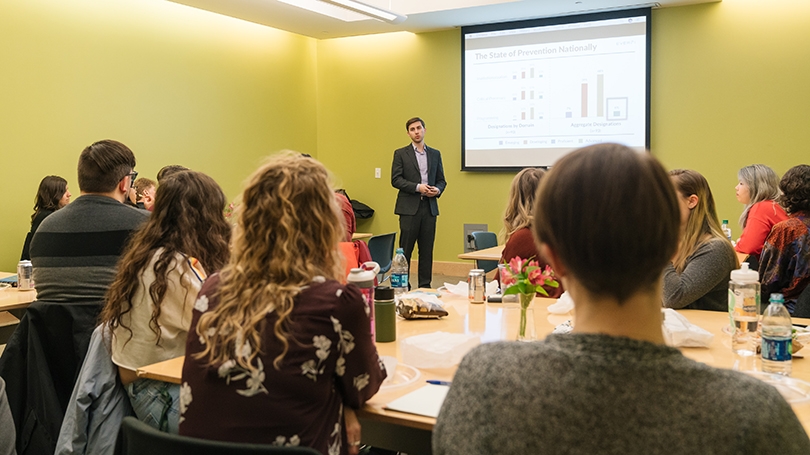
- About
- Wellbeing
- Prevention & Education
- Get Involved
- News & Events
Back to Top Nav
Back to Top Nav
Back to Top Nav
Back to Top Nav
Back to Top Nav
Education technology firm ranks College in top 6 percent nationally for best practices.
Dartmouth is in the top 6 percent of institutions nationwide in terms of adopting best practices in sexual assault prevention, according to an assessment by education technology company EVERFI, which has worked with the College on some of the online components of Dartmouth’s prevention efforts.
On Wednesday, representatives of the company briefed students and staff involved with the College’s Sexual Violence Prevention Project on the results of a Sexual Assault Diagnostic Inventory EVERFI conducted at nearly 100 colleges and universities, says Amanda Childress, associate director of the Student Wellness Center and lead developer of the Sexual Violence Prevention Project.
“It’s an indicator for us that we are on the right path,” says Childress.
Dartmouth, which completed EVERFI’s diagnostic inventory in the spring of 2016, was one of five institutions that won the Campus Prevention Network’s 2017 Prevention Excellence Award for outstanding achievements in sexual assault prevention last July. The EVERFI representatives on campus this week shared additional data from the national inventory of college prevention efforts.
The presentation was attended by some 25 people, including Dartmouth wellness center staff and students from the following groups: Movement Against Violence (MAV), the Student & Presidential Committee on Sexual Assault (SPCSA), Sexual Assault Peer Alliance (SAPA), the Sexual Violence Prevention Project’s Student Advisory Board (SVPP SAB), and Sexual Health Peer Educators (Sexperts).
The diagnostic survey assesses institutions based on a 100-item inventory. The data is in three sections: institutionalization, which looks at foundational support such as mission statements and budget prioritization; critical processes and policy, which looks at issues such as how often policies are revised, and what procedures are in place to assess whether programs are effective; and programming, which looks at data such as what portion of the student population is reached by programs, whether staff delivering the programs are well trained, and that programs are based on best practices.
The data presented Wednesday showed that Dartmouth’s sexual violence prevention work consistently scored higher in each of these areas than the average score of all the institutions that participated in EVERFI’s inventory.
“It’s helpful to see how we measure up and how we compare to other institutions. We are doing good work right now and our efforts are informed by research and best practices. The goal is to get to a place where we are preventing harm completely,” Childress says.
The Sexual Violence Prevention Project is part of Dartmouth’s Moving Dartmouth Forward (MDF) initiative, an effort to make the Dartmouth campus more inclusive and reduce high-risk behavior. As part of MDF, the Sexual Violence Prevention Project aims to reduce sexual assault, dating violence, stalking, and harassment through a system of educational opportunities that begin before matriculation and continue through students’ time at Dartmouth.
William Platt can be reached at william.c.platt@dartmouth.edu.